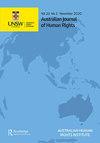Australia joins the ‘global Magnitsky movement’
Q1 Arts and Humanities
引用次数: 0
Abstract
ABSTRACT So-called Magnitsky laws allow states to use the tools available to the domestic system to sanction human rights abusers and corrupt actors that commit their violations abroad. Such tools include visa bans, asset freezes and restrictions on the use of banking systems. Other major Western powers have already enacted Magnitsky laws: in December 2021 Australia followed suit, and thus joined what has been dubbed the ‘global Magnitsky movement’. This commentary considers the relatively short history of Magnitsky laws, including the death of their namesake, Russian tax advisor Sergei Magnitsky. The seeming impunity of those behind his murder triggered a campaign for states to use domestic law to somehow punish perpetrators of egregious human rights violations and serious corruption, where they have not otherwise been held to account. By joining the global Magnitsky movement, Australia falls in line with its allies; depending on how the government elects to use its new sanctions power, this will inevitably come at some diplomatic cost.澳大利亚加入“全球马格尼茨基运动”
摘要所谓的马格尼茨基法律允许各国利用国内系统可用的工具,制裁在国外侵犯人权的侵犯人权者和腐败行为者。这些工具包括签证禁令、资产冻结和限制银行系统的使用。其他西方大国已经颁布了马格尼茨基法律:2021年12月,澳大利亚紧随其后,加入了所谓的“全球马格尼茨基运动”。这篇评论考虑了马格尼茨基法律相对较短的历史,包括与之同名的俄罗斯税务顾问谢尔盖·马格尼茨基的死亡。谋杀他的幕后黑手似乎不受惩罚,这引发了一场运动,要求各国利用国内法以某种方式惩罚严重侵犯人权和严重腐败的肇事者,否则他们将不会被追究责任。通过加入全球马格尼茨基运动,澳大利亚与盟友结盟;根据政府选择如何使用其新的制裁权力,这将不可避免地付出一些外交代价。
本文章由计算机程序翻译,如有差异,请以英文原文为准。
求助全文
约1分钟内获得全文
求助全文
来源期刊

Australian Journal of Human Rights
Arts and Humanities-History
CiteScore
1.30
自引率
0.00%
发文量
43
期刊介绍:
The Australian Journal of Human Rights (AJHR) is Australia’s first peer reviewed journal devoted exclusively to human rights development in Australia, the Asia-Pacific region and internationally. The journal aims to raise awareness of human rights issues in Australia and the Asia-Pacific region by providing a forum for scholarship and discussion. The AJHR examines legal aspects of human rights, along with associated philosophical, historical, economic and political considerations, across a range of issues, including aboriginal ownership of land, racial discrimination and vilification, human rights in the criminal justice system, children’s rights, homelessness, immigration, asylum and detention, corporate accountability, disability standards and free speech.
 求助内容:
求助内容: 应助结果提醒方式:
应助结果提醒方式:


